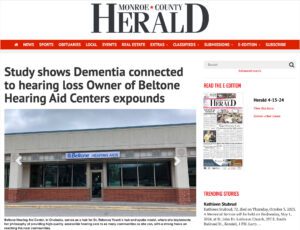
By BENNY MAILMAN Editor Friday, January 13, 2023
Doctor of Audiology, Rebecca A. Younk, is the owner of many Beltone Hearing Aid Centers, which can be found in many areas of eastern Minnesota and western Wisconsin. Based out of Saint Paul, Minnesota, Doctor Younk has hubs in Onalaska and Eau Claire, and provides local service to Tomah, Sparta, Viroqua, and Hillsboro. Recently, there have been studies that have shown that there is a link between hearing loss and dementia. As well, it has shown that hearing aids might be an effective tool in preventing cognitive decline and dementia.
The Journal of the American Medical Association (JAMA), on December 5th, 2022, published the results of a new study, which indicates that managing hearing loss may potentially reduce or delay cognitive decline.
From: JAMA Neurol. Published online December 5, 2022. doi:10.1001/jamaneurol.2022.4427
A meta-analysis of 31 studies, with 137,484 participants, both observational and trials, the research looked at the association between hearing loss and cognitive decline over a range of durations, from two to 25 years. The review found that people with hearing loss, who wore devices to help, performed 3% better on cognitive scores in the short term, according to the study.
The use of hearing aids was associated with a 19% reduction in long-term cognitive decline, the study found. When it comes to cognitive decline, preventing progression is important, the study authors noted.
“Dementia is far easier to prevent than treat, and exceedingly difficult to reverse,” said senior study author, Dr. Benjamin Tan, Dean’s Fellow at the Yong Loo Lin School of Medicine, National University of Singapore.
“Hearing loss, while a big risk factor for cognitive decline, is fairly easy to correct in developed countries,” said Dr. Thomas Holland, physician scientist of the Rush Institute for Health Aging. Holland was not involved in the research. “Get screened for hearing loss, and if you do have hearing loss, speak with your audiologist or physician, to ensure appropriate and optimal correction, in order to help stave off the potential dementia risk and cognitive decline,” Holland said.
With this new study, Dr. Younk suggests that people should really pay attention to their hearing ability and address issues immediately upon diagnosis. “As soon as you have issues that decline from your baseline hearing, seek immediate intervention,” says Dr. Younk. “Loss of hearing also increases risks of falls, depression and hospitalization, so in addition to helping with dementia, these are crucial factors that will be addressed with hearing aids as well.”
Dr. Younk went on to say how important family members are in this process. “Often times, the family members know more about what you are missing and are more tuned in to the changes that are happening,” she stated. “Sometimes the change can be so gradual that you, yourself, may not even notice it until it has progressed to a high level.”
Early signs of hearing loss include:
-Difficulty understanding speech in noisy environments.
-Feeling like people are mumbling and their speech is unclear.
-Saying things like, “I can hear, but I cannot understand.”
-Family and friends often need to repeat themselves for you.
-Difficulty understanding someone if you are not looking at them.
-Your family says that the television or radio is too loud.
-You have increased frustration during conversations.
-You avoid social situations because it is hard to hear.
Early signs of dementia include:
-Forgetfulness, especially of recently learned information.
-Difficulty performing tasks that are familiar. (preparing a meal, making a phone call)
-Disorientation to time and place. (getting lost in familiar areas)
-Poor or decreased judgement. (financial decisions, clothing choices)
-Changes in mood or behavior.
-Change in personality
-Loss of initiative; becoming more passive.
Doctor Rebecca Younk says that her mission is to provide people with hearing loss quality hearing care. In order to achieve this, Dr. Younk uses the hub and spoke model. She has her main hub for this area, located in Onalaska, at 2854 Midwest Drive, suite 102. Smaller communities, like Sparta and Tomah, are spokes. “We partner with the Sparta Barney Family Community Center,” says Dr. Younk. “We see patients in Sparta once or twice a month, with our next visit being on the 24th of January.” In Sparta, hearing instrument specialists, Amy Meyer and Torry Rhoades, conduct hearing evaluations, hearing aid consultations and even hearing aid maintenance and repairs.
Portions of this article came from CNN.com, and can be viewed in its entirety at:
The Onalaska office is open Monday through Friday, from 9 a.m. to 5 p.m., and their phone number is (608)- 783-7399.